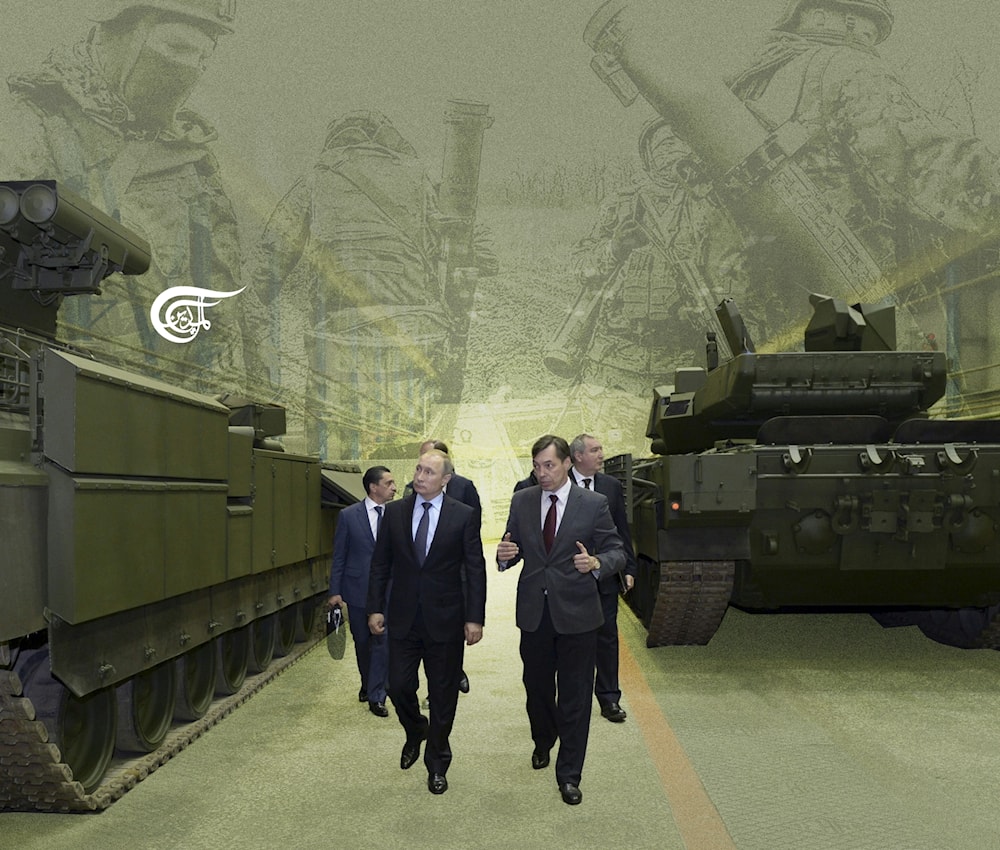As Ukraine’s Defeat Looms, Imaginary War Unravels
With the Imaginary War nearing over, and the Zionist genocide in Gaza beginning, it was, of course, necessary to wind down “OSINT” operations entirely, or focus them elsewhere.
-

As Ukraine’s Defeat Looms, Imaginary War Unravels (Illustrated by Mahdi Rteil to Al Mayadeen English)
On April 11th, US General Christopher Gerard Cavoli, chief of Washington’s European Command and Supreme Allied Commander Europe, addressed US lawmakers on Ukraine’s dire battlefield situation, warning Kiev “could lose” without further Wunderwaffe. Along the way, he made a number of startling disclosures about the size of Russia’s military, and losses, which detonated numerous narratives universally and unquestioningly perpetuated by the mainstream media from the very start of the proxy war to this day.
“We do not see significant losses in the air domain, especially their (Russian) long-range and strategic aviation fleets…Russia’s strategic forces, long-range aviation, cyber capabilities, space capabilities, and capabilities in the electromagnetic spectrum have lost no capacity at all,” Cavoli said. In all, while the Russian air force had lost “some aircraft”, this represented “only about 10% of their fleet”:
“The overall message I would give you is [Russia’s military has] grown back to what they were before…their overall capacity is very significant still, and they intend to make it go higher…Russia is reconstituting [its forces] far faster than our initial estimates suggested. The army is actually now larger — by 15% — than it was when it invaded Ukraine…Russia launches very large-scale attacks every few days keeping with their production rate…They produce, they save up, they launch a big attack.”
Such is the pace at which events move these days, many may have forgotten that in December 2023 a US intelligence report, conveniently declassified right when Volodymyr Zelensky was touring Washington desperately attempting to drum up support for yet more “aid”, suggested Russia had lost 90% of its prewar army, with combat deaths in excess of 300,000. The report claimed Moscow’s personnel and vehicle losses were so severe, it would take 18 years to replenish what was hemorrhaged over the invasion to date.
Independent analyst Will Schryver has coined the term “Imaginary War” in respect of the proxy conflict. It is a battle primarily concerned with convincing Western citizens that free, democratic Kiev is making a heroic stand against Russian barbarism, which it can and will win. Ukraine, with NATO’s backing, was until recently excelling in this effort. Every step of the way though, they’ve been losing the real war - and badly.
‘Intelligence Updates’
Social media is a core component of the Imaginary War. Academic research shows Twitter is home to a massive pro-Ukraine bot army, endlessly pumping out pro-Kiev, anti-Russian messaging. The same is no doubt true of every social media platform. This helps create the illusion of nigh-universal support for Ukraine globally, when outside the West, populations and governments are either neutral, or outright supportive of Russia, perceiving the conflict to be a strike against NATO, and Western imperialism.
Furthermore, over the first 18 months of the conflict, mainstream journalists, pundits, and politicians heavily depended on the unsubstantiated pronouncements of “Oryx”, an anonymous Twitter account analysing on-the-ground imagery, for loss figures on both sides. Its posts suggested from day one, destruction of Russian tanks, jets, armoured vehicles and more was many orders of magnitude higher than that suffered by Ukraine, indicative generally of the war being an unmitigated disaster for the invaders.
A representative March 17th 2022 Washington Post investigation boldly declared Russia had to date “lost thousands of soldiers and thousands of vehicles while failing to make significant progress,” based almost entirely on Oryx’s findings. Similarly, a BBC article the next month prominently touted figures produced by Oryx suggesting Ukraine had “destroyed, damaged or captured at least 82 Russian aircraft, including jets, helicopters and drones,” while only sacrificing 33 of its own.
A nameless Western intelligence official told the BBC Kiev desperately required “long and mid-range air defences”, in “large quantities.” UAF Captain Vasyl Kravchuk, reportedly possessed of a “surprisingly ready smile” when he spoke to Britain’s state broadcaster, signed off by stating, “past wars have shown, whoever dominates the air wins the war.” The underlying propaganda message, that Ukraine was so far comfortably prevailing in the skies, but needed Western help to keep it up - and therefore emerge victorious overall - couldn’t have been clearer.
Oryx’s findings were even routinely cited by Britain’s Ministry of Defence in daily Twitter “intelligence updates”, which were widely shared, and subsequently featured in and informed the content and headlines of many news reports. For example, in April 2023 an update asserted, “Russia has lost 10,000+ military vehicles since its illegal invasion of Ukraine began, according to tracker Oryx.” The post was viewed over one million times. Parliament’s 2023 Intelligence and Security Committee report boasted that “the impact” of these “unprecedented” updates was “substantial”.
The report went on to note how the Ministry of Defence intelligence estimates “informed decisions made by [government] ministers and Armed Forces chiefs” on London’s “posture towards Russia.” One can only hope Oryx’s output did not formally influence Britain’s proxy war strategy in Ukraine. Audits by eagle-eyed internet sleuths have demonstrated the account consistently perpetuated wildly inaccurate, inflated figures, by counting photos and footage of the same damaged vehicles shot from different angles as individual, separate Russian losses, while misrepresenting Ukraine’s destroyed Soviet-era vehicles as Russian.
Conspicuously, Oryx abruptly ceased its work when Ukraine’s much-vaunted, long-delayed “Spring” counteroffensive began in June 2023. A cynic might suggest, given Kiev was equipped with heavily hyped Western Wunderwaffe for the effort, whoever was running the operation - and/or the individuals and entities ultimately managing them - concluded the same dishonest tactics couldn’t work this time round. In October 2023, the account was deleted outright without warning or explanation, meaning its bogus archive can no longer be critically scrutinised at all.
‘Classic Hero’
Coincidentally, that same month, a number of anonymous, high profile “OSINT” accounts similarly focused on Ukraine likewise abruptly shuttered, or announced their intention to do so. This included Calibre Obscura. Beloved by NAFO, the account similarly emphasised Russian embarrassment and failure. A video Calibre Obscura published in September 2022 of a fleeing Russian tank crashing into a tree set to farcical music went viral, generated much mainstream coverage, and was presented by Zelensky at a press conference celebrating that month’s successful counteroffensive in Kharkiv.
With the Imaginary War nearing over, and the Zionist genocide in Gaza beginning, it was of course necessary to wind down “OSINT” operations entirely, or focus them elsewhere. The silence of Bellingcat, a British and US government-funded validator of NATO narratives, on Israel’s crimes, despite a wealth of photo and video footage attesting to the monstrousness, is palpable, and illuminating.
In December 2023, novelist Lionel Shriver authored a lament for The Spectator, on how she “got caught up” in the proxy conflict’s “story”, which “had a spectacular opening chapter, a classic hero…and as wicked a villain as Shakespeare could have contrived.” However, Kiev’s catastrophic counteroffensive - which saw over 100,000 Ukrainians die to recover 0.25% of lost territory - meant she was now “quietly losing interest in this conflict,” along with many others in Europe and the US:
“This is supposed to be a David and Goliath story. But David and Goliath is a crap story if the giant wins…Predictable, a bit disheartening and not really a story at all, just the way the world works. Besides, a Western audience wants to see the good guy win, both to mete out justice and to enjoy victory by proxy. Ukraine’s anguishing self-defence is not a novel. But it’s not satisfying our fictional appetites.”
Shriver concluded that it was “time to urge the Zelensky government to enter talks to bring this depressing war to its depressing conclusion,” as “dragging out an entrenched stalemate merely racks up a higher body count and destroys more Ukrainian homes and infrastructure to no purpose.” She added, “sitting back and giving Ukrainians just enough weaponry to keep fighting to the last man and woman, only for the country to finally end up where we always knew it would, is not just immoral. It’s murder.”
It is indeed immoral, and murder, to keep the unwinnable, real war Ukraine has been fighting since February 2022 grinding on, as anti-imperialist, anti-war activists and journalists have been intoning every step of the way. That confirming this self-evident fact came at the expense of so many lives, marking it as a criminal tragedy. Unhappily for Shriver and many others, with the total collapse of the frontline impending any day now, and Russia seeking Kiev’s “unconditional surrender”, the “story” may not end with Ukraine electively entering talks.

 Kit Klarenberg
Kit Klarenberg
 8 Min Read
8 Min Read











